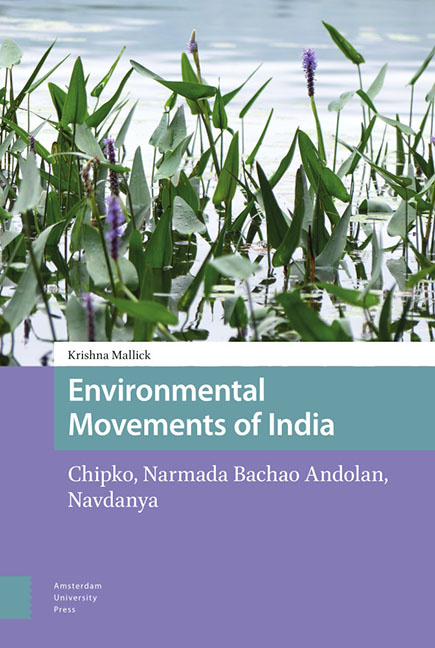Book contents
- Frontmatter
- Dedication
- Contents
- Acknowledgments
- Foreword
- Glossary
- Introduction: Three Grassroots Movements That Made a Global Impact
- 1 Historical and Cultural Contexts in India
- 2 Chipko (Hug the Trees) Movement
- 3 Narmada Bachao Andolan (NBA): Save the Narmada
- 4 Navdanya (Nine Seeds) Movement
- 5 Moral Implications of Environmental Movements
- 6 Hindu Ethics and Ecology
- Conclusion: The Symbiosis of Natural Resources and Local Needs
- Index
5 - Moral Implications of Environmental Movements
Published online by Cambridge University Press: 13 November 2021
- Frontmatter
- Dedication
- Contents
- Acknowledgments
- Foreword
- Glossary
- Introduction: Three Grassroots Movements That Made a Global Impact
- 1 Historical and Cultural Contexts in India
- 2 Chipko (Hug the Trees) Movement
- 3 Narmada Bachao Andolan (NBA): Save the Narmada
- 4 Navdanya (Nine Seeds) Movement
- 5 Moral Implications of Environmental Movements
- 6 Hindu Ethics and Ecology
- Conclusion: The Symbiosis of Natural Resources and Local Needs
- Index
Summary
Abstract
This chapter delves into the importance of the well-being of all human beings, including the voices of the marginalized people in the community who are directly and negatively affected by deforestation, dam-building, and GMOs in India. It has been argued that Gandhi was not an environmentalist, although he believed in the oneness of nature. The chapter also considers the six core values that development ethicists have proposed, highlighting the moral aspect and the gender bias of the resettlement and rehabilitation policies aimed at the dispossessed people of the Narmada case. The chapter concludes with an analysis of the Chipko movement's connection to ecofeminism and the ethics of care.
Keywords: development ethics, globalization, southern materialist ecofeminism, human well-being, resettlement and rehabilitation, gendered environmental justice
The Mesmerizing Power of Nonviolence
Mahatma Gandhi's life and work have had a considerable influence on environmental movements in India. In one of the first printed accounts of the Chipko movement, ‘a breathless journalist announced that Gandhi's ghost had saved the Himalayan trees’ (Guha, 1995, p. 47). Since that time, Gandhi has been the typically acknowledged patron saint of environmental activists, many of whom rely greatly on Gandhian techniques of nonviolent protest and draw extensively on Gandhi's polemic against heavy industrialization. Some of the Chipko movement's better-known figures, including Chandi Prasad Bhatt, Sunderlal Bahuguna, and Baba Amte, have repeatedly underlined their debt to Gandhi (Guha, 1995). This chapter presents the moral and philosophical underpinnings of environmental movements – from Gandhi's satyagraha to globalism, from the theory of development ethics as applied to the Narmada case to the burgeoning ecofeminist movements that remind us of our interdependence with natural resources as well as with each other.
Nonviolence, as envisioned by Gandhi, has the power to solve many of our problems, including ecological crises. Indeed, Gandhian nonviolence has been accepted by many different environmental movements as a vital principle. These movements have laid claim to Gandhian values of ecological prudence and frugality as well as decentralized democracy through village swaraj, or self-rule.
- Type
- Chapter
- Information
- Environmental Movements of IndiaChipko, Narmada Bachao Andolan, Navdanya, pp. 115 - 142Publisher: Amsterdam University PressPrint publication year: 2021



